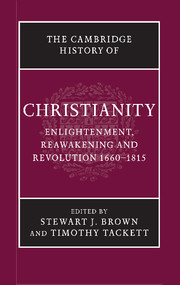Book contents
- Frontmatter
- Introduction
- PART I CHURCH, STATE, AND SOCIETY IN THE EUROPEAN WORLD, 1660–1780
- PART II CHRISTIAN LIFE IN THE EUROPEAN WORLD, 1660–1780
- PART III MOVEMENTS AND CHALLENGES
- PART IV CHRISTIAN DEVELOPMENTS IN THE NON-EUROPEAN WORLD
- PART V REVOLUTION AND THE CHRISTIAN WORLD
- 25 The American Revolution and religion, 1765–1815
- 26 Christianity and the campaign against slavery and the slave trade
- 27 The French Revolution and religion to 1794
- 28 The French Revolution and religion, 1795–1815
- 29 Movements of Christian awakening in revolutionary Europe, 1790–1815
- Chronology
- Bibliography
- Index
- References
26 - Christianity and the campaign against slavery and the slave trade
from PART V - REVOLUTION AND THE CHRISTIAN WORLD
Published online by Cambridge University Press: 28 March 2008
- Frontmatter
- Introduction
- PART I CHURCH, STATE, AND SOCIETY IN THE EUROPEAN WORLD, 1660–1780
- PART II CHRISTIAN LIFE IN THE EUROPEAN WORLD, 1660–1780
- PART III MOVEMENTS AND CHALLENGES
- PART IV CHRISTIAN DEVELOPMENTS IN THE NON-EUROPEAN WORLD
- PART V REVOLUTION AND THE CHRISTIAN WORLD
- 25 The American Revolution and religion, 1765–1815
- 26 Christianity and the campaign against slavery and the slave trade
- 27 The French Revolution and religion to 1794
- 28 The French Revolution and religion, 1795–1815
- 29 Movements of Christian awakening in revolutionary Europe, 1790–1815
- Chronology
- Bibliography
- Index
- References
Summary
The British abolitionist Thomas Clarkson, author of the first history of the Anglo-American antislavery movements, attributed the public campaigns against the slave trade to the influence of religious progress. The 1807 abolition of the American and British slave trades represented, he thought, the fulfilment of Christian teachings and a vindication of the faith. In other cultures and at other times, Clarkson acknowledged, religious leaders had encouraged and facilitated beneficence to the weak and the needy. Only Christianity, however, had made possible the more ambitious commitment to rid entire societies of long-accepted customs and practices that degraded the human race. The Christian faith, and Protestantism in particular, had invested the impulse to benevolence with a new vitality and had extended its reach across the widest possible domain. ‘To Christianity alone’, Clarkson insisted, ‘we are indebted for the new and sublime spectacle of seeing men and women go beyond the bands of individual usefulness to each other; of seeing them associate for the extirpation of private and public misery; and of seeing them carry their charity, as a united brotherhood, into distant lands’.
Over the proceeding four centuries, however, as Thomas Clarkson knew, it was Christian Europe that had devised and operated a vast transatlantic traffic which had conveyed, as of 1808, more than 8 million African men, women, and children to the Americas and led to the death and enslavement in Africa and the Americas of many millions more. Professed Christians sold, purchased, and worked African slaves everywhere in the new American settlements, from Quebec to Quito.
- Type
- Chapter
- Information
- The Cambridge History of Christianity , pp. 517 - 535Publisher: Cambridge University PressPrint publication year: 2006



